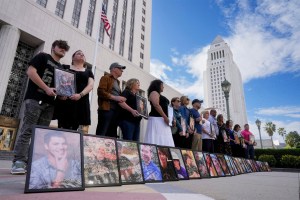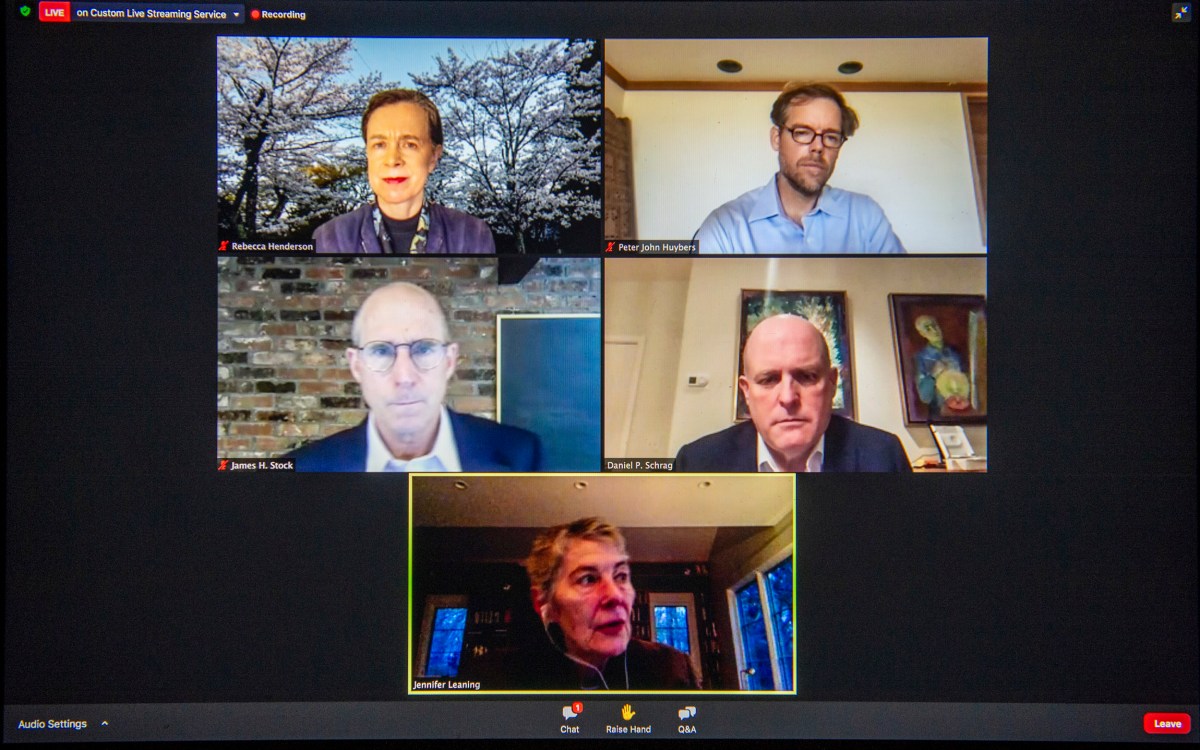
John Kerry, the special presidential envoy for climate change, was among the experts at a daylong conference, “Climate Change, Intelligence, and Global Security.”
Benn Craig/Belfer Center
Climate change as a national security issue
Former Secretary of State Kerry calls it one of the biggest threats facing the nation
Climate change is increasingly being recognized as a factor in global security as floods and drought displace populations and famine and disease destabilize governments.
“The climate crisis is just that,” said former U.S. Secretary of State John Kerry, now the special presidential envoy for climate change, at a daylong Harvard symposium Friday. “But it is also a national security issue.”
Chatting with Calder Walton, assistant director of the Belfer Center’s Applied History Project and Intelligence Project, Kerry outlined the implications. “We know that the climate crisis can produce countless refugees,” he said, detailing climate issues that uproot populations, from food insecurity and drought to floods. Such conditions, he said, “become a cauldron for extremist organizing and proselytizing.” As well as destabilizing other countries, these conditions threaten our own readiness, he added, posing a potential existential threat.
Kerry was among the experts who explored the topic during “Climate Change, Intelligence, and Global Security Conference,” sponsored by the Belfer Center for Science and International Affairs and the Center for Climate and Security. The online event picked up on the themes of the international Leaders Summit on Climate launched by the White House the day before.
“If climate change is an existential threat it should be dealt with as other existential threats are,” Kerry stressed. “But we are not.”
The intelligence community, Kerry explained, must be central to any response. “In my judgment, climate change is the biggest non-state-actor threat there is, and we have a lot of planning to do,” said Kerry. “But we want to know a lot more than we know. I want the intelligence community to tell me as much as they do before I go into negotiations.”
If climate change is to be considered an intelligence issue, Walton asked, how should findings be treated? “We’re always very careful in the sharing that we do,” said Kerry, who ran the State Department from 2013-2017 during the Obama administration. “That will not change, nor should it. But it seems to me that in climate there’s a different kind of intelligence. You still want to protect your sources and methods, but you could share judgments made off the more public information.”
“If climate change is an existential threat it should be dealt with as other existential threats are. But we are not.”
John Kerry
The Kennedy School’s Graham T. Allison, Douglas Dillon Professor of Government, then joined in, bringing up the question of whether the global community could trust commitments made by the Biden administration for as far away as 2030. In response, Kerry pointed out that the response to climate change transcends politics. Even during the Trump administration, progress was not halted, he said. “A thousand-plus mayors and 30-plus governors all stood up and said, ‘We are staying in the Paris Agreement,’” he said. Despite pressure from the Trump administration, “we did cut emissions. We continued to pursue our renewable portfolio laws, and 75 percent of the new electricity that came on line was from renewable sources.”
Ultimately, Kerry explained, the world could trust the United States to keep its commitments because working for a greener economy is good business. “The marketplace is moving in this direction,” he said. Citing General Motors’ pledge to only produce electric vehicles by 2035, he noted how other businesses are seeking the “Holy Grail” of carbon collection while still others are investing in green energies or improved battery storage.
“No politician is going to come in four years from now and suddenly undo that,” he said. “It’s being done for all the rational reasons.” Calling climate change an existential threat once more and citing the “huge price” we will pay if we do not address it, he added, “we’re going to do it because that’s where the market is going to be, and people are going to make money in the doing of it.
“I don’t believe any politician – no matter how big a demagogue they are – can undo that,” he concluded.
Discussions throughout the summit elaborated on the nature and the scope of the threat. Citing factors from rising sea levels, unpredictable storms, rampant wildfires and floods, Sherri Goodman J.D./M.P.P. ’87, a senior strategist at the Center for Climate and Security, began the opening overview panel with a definitive statement: “Climate change is now a destabilizing force.”
“When you have a scan of the world, you see all kinds of fault lines along economic, political, religious lines,” added Vice Admiral Dennis V. McGinn (retired), a member of the Center’s Advisory Board and a senior member of the executive committee at the International Military Council on Climate and Security. “Climate change and extreme weather events pressurize these fault lines and cause fragile societies and fragile governments to fail.”
The rewards of addressing climate change, however, may be profound. “We are finding sources of energy — wind, geothermal, solar — are much better,” said McGinn. In addition, green energy, he noted, is increasing job creation “by a factor of five or more.”
While certain specifics, such as the speed of sea-level rise, may still be debatable, the reality of our changing climate and its eventual effects are not. As John P. Holdren, Teresa and John Heinz Professor of Environmental Policy at HKS and co-director of the Science, Technology, and Public Policy program, said, “The biggest uncertainty is what human society decides to do.”







